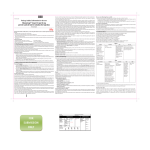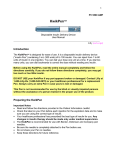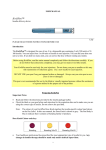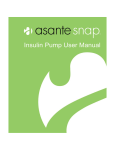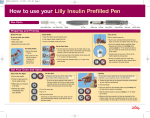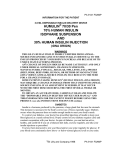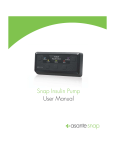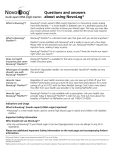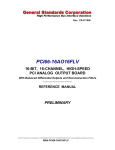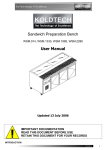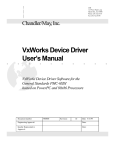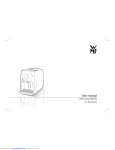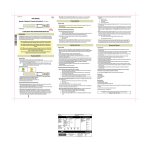Download PA 9117 FSAMP Lilly Prefilled Insulin Delivery Device User Manual
Transcript
1 PA 9117 FSAMP Lilly Prefilled Insulin Delivery Device User Manual Instructions for Use Read and follow all of these instructions carefully. If you do not follow these instructions completely, you may get too much or too little insulin. Every time you inject: • Use a new needle • Prime to make sure the Pen is ready to dose • Make sure you got your full dose (see page 18) Also, read the “Patient Information” enclosed in your Pen box. Pen Features • A multiple dose, prefilled insulin delivery device (“insulin Pen”) containing 3 mL (300 units) of U-100 insulin • Delivers up to 60 units per dose • Doses can be dialed by single units 2 Table of Contents _______________________________________________________________ Pen Parts ..........................................................................................................3 Important Notes................................................................................................ 4 Preparing the Pen ............................................................................................ 6 Attaching the Needle ........................................................................................ 8 Priming the Pen.............................................................................................. 10 Setting a Dose................................................................................................ 14 Injecting a Dose ............................................................................................. 16 Following an Injection..................................................................................... 18 Questions and Answers ................................................................................. 20 _______________________________________________________________ 2 3 Pen Parts Injection Button Dose Knob Raised Notch Raised Notch 3 Dose Window Label Pen Cap Insulin Cartridge Clear Cartridge Holder Rubber Seal Needle Paper Tab Inner Needle Shield Outer Needle Shield 3 4 Important Notes • Read and follow all of these instructions carefully. If you do not follow these instructions completely, you may get too much or too little insulin. • Use a new needle for each injection. • • • Be sure a needle is completely attached to the Pen before priming, setting the dose and injecting your insulin. Prime every time. • The Pen must be primed before each injection to make sure the Pen is ready to dose. Performing the priming step is important to confirm that insulin comes out when you push the injection button, and to remove air that may collect in the insulin cartridge during normal use. See Section III. “Priming the Pen”, pages 10-13. • If you do not prime, you may get too much or too little insulin. Make sure you get your full dose. • To make sure you get your full dose, you must push the injection button all the way down until you see a diamond (♦) or an arrow ( ) in the center of the dose window. See “Following an Injection”, page 18. • The numbers on the clear cartridge holder give an estimate of the amount of insulin remaining in the cartridge. Do not use these numbers for measuring an insulin dose. • Do not share your Pen or needles. • Keep your Pen and needles out of the reach of children. • Pens that have not been used should be stored in a refrigerator but not in a freezer. Do not use a Pen if it has been frozen. Refer to the “Patient Information” for complete storage instructions. 4 5 Important Notes (Continued) • After a Pen is used for the first time, it should NOT be refrigerated but should be kept at room temperature [below 86°F (30°C)] and away from direct heat and light. • An unrefrigerated Pen should be discarded according to the time specified in the “Patient Information”, even if it still contains insulin. • Never use a Pen after the expiration date stamped on the label. • Do not store your Pen with the needle attached. Doing so may allow insulin to leak from the Pen and air bubbles to form in the cartridge. Additionally, with suspension (cloudy) insulins, crystals may clog the needle. • Always carry an extra Pen in case yours is lost or damaged. • Follow your Health Care Professional’s instruction for safe handling of needles and disposal of empty pens. • This Pen is not recommended for use by blind or visually impaired persons without the assistance of a person trained in the proper use of the product. • The directions regarding needle handling are not intended to replace local, Health Care Professional, or institutional policies. • Any changes in insulin should be made cautiously and only under medical supervision. 5 6 I. Preparing the Pen 1. Before proceeding, refer to the “Patient Information” for instructions on checking the appearance of your insulin. 2. Check the label on the Pen to be sure the Pen contains the type of insulin that has been prescribed for you. 3. Always wash your hands before preparing your Pen for use. 4. Pull the Pen cap to remove. 6 7 I. Preparing the Pen (Continued) 5. If your insulin is a suspension (cloudy): a. Roll the Pen back and forth 10 times then perform step b. b. Gently turn the Pen up and down 10 times until the insulin is evenly mixed. Note: Suspension (cloudy) insulin cartridges contain a small glass bead to assist in mixing. 6. Use an alcohol swab to wipe the rubber seal on the end of the Pen. 7 8 II. Attaching the Needle This device is suitable for use with Becton Dickinson and Company’s insulin pen needles. 1. Always use a new needle for each injection. Do not push injection button without a needle attached. Storing the Pen with the needle attached may allow insulin to leak from the Pen and air bubbles to form in the cartridge. 2. Remove the paper tab from the outer needle shield. 3. Attach the capped needle onto the end of the Pen by turning it clockwise until tight. 8 9 II. Attaching the Needle (Continued) 4. Hold the Pen with the needle pointing up and remove the outer needle shield. Keep it to use during needle removal. 5. Remove the inner needle shield and discard. 9 10 III. Priming the Pen • Prime every time. The Pen must be primed to a stream of insulin (not just a few drops) before each injection to make sure the Pen is ready to dose. • You may need to prime a new Pen up to six times before a stream of insulin appears. • If you do not prime, you may get too much or too little insulin. • Always use a new needle for each injection. 1. Make sure the arrow ( ) is in the center of the dose window as shown. 2. If you do not see the arrow in the center of the dose window, push in the injection button fully and turn the dose knob until the arrow is seen in the center of the dose window. Correct 10 11 III. Priming the Pen (Continued) 3. With the arrow in the center of the dose window, pull the dose knob out in the direction of the arrow until a “0” is seen in the dose window. 4. Turn the dose knob clockwise until the number “2” is seen in the dose window. If the number you have dialed is too high, simply turn the dose knob backward until the number “2” is seen in the dose window. 11 12 III. Priming the Pen (Continued) 5. Hold your Pen with the needle pointing straight up. Tap the clear cartridge holder gently with your finger so any air bubbles collect near the top. Using your thumb, if possible, push in the injection button completely. Keep pressing and continue to hold the injection button firmly while counting slowly to 5. You should see a stream of insulin come out of the tip of the needle. If a stream of insulin does not come out of the tip of the needle, repeat steps 1 through 5. If after six attempts a stream of insulin does not come out of the tip of the needle, change the needle. Repeat steps 1 through 5 up to two more times. If you are still unable to get insulin flowing out of the needle, do NOT use the Pen. Contact your Health Care Professional or Lilly. 12 13 III. Priming the Pen (Continued) 6. At the completion of the priming step, a diamond (♦) must be seen in the center of the dose window. If a diamond (♦) is not seen in the center of the dose window, continue pushing on the injection button until you see a diamond (♦) in the center of the dose window. Correct Note: A small air bubble may remain in the cartridge after the completion of the priming step. If you have properly primed the Pen, this small air bubble will not affect your insulin dose. 7. Now you are ready to set your dose. See next page. 13 14 IV. Setting a Dose • Always use a new needle for each injection. Storing the Pen with the needle attached may allow insulin to leak from the Pen and air bubbles to form in the cartridge. • Caution: Do not push in the injection button while setting your dose. Failure to follow these instructions carefully may result in getting too much or too little insulin. If you accidentally push the injection button while setting your dose, you must prime the Pen again before injecting your dose. See Section III. “Priming the Pen”, pages 10-13. 1. A diamond must be seen in the center of the dose window before setting your dose. If you do not see a diamond in the center of the dose window, the Pen has not been primed correctly and you are not ready to set your dose. Before continuing, repeat the priming steps. Correct 2. Turn the dose knob clockwise until the arrow ( ) is seen in the center of the dose window and the notches on the Pen and dose knob are in line. 14 15 IV. Setting a Dose (Continued) 3. With the arrow ( ) in the center of the dose window, pull the dose knob out in the direction of the arrow until a “0” is seen in the dose window. A dose cannot be dialed until the dose knob is pulled out. 4. Turn the dose knob clockwise until your dose is seen in the dose window. If the dose you have dialed is too high, simply turn the dose knob backward until the correct dose is seen in the dose window. 5. If you cannot dial your full dose, see the “Questions and Answers” section, Question 6, at the end of this manual. 15 16 V. Injecting a Dose • Always use a new needle for each injection. Storing the Pen with the needle attached may allow insulin to leak from the Pen and air bubbles to form in the cartridge. • Caution: Do not attempt to change the dose after you begin to push in the injection button. Failure to follow these instructions carefully may result in getting too much or too little insulin. • The effort needed to push in the injection button may increase while you are injecting your insulin dose. If you cannot completely push in the injection button, refer to the “Questions and Answers” section, Question 8, at the end of this manual. • Do not inject a dose unless the Pen is primed, just before injection, or you may get too much or too little insulin. • If you have set a dose and pushed in the injection button without a needle attached or if no insulin comes out of the needle, see the “Questions and Answers” section, Questions 1 and 2. 16 17 V. Injecting a Dose (Continued) 1. Wash hands. Prepare the skin and use the injection technique recommended by your Health Care Professional. 2. Insert the needle into your skin. Inject the insulin by using your thumb, if possible, to push in the injection button completely. 3. Keep pressing and continue to hold the injection button firmly while counting slowly to 5. 4. When the injection is done, a diamond (♦) or an arrow ( ) must be seen in the center of the dose window. This means your full dose has been delivered. If you do not see a diamond or an arrow in the center of the dose window, you did not get your full dose. Contact your Health Care Professional for additional instructions. Correct Correct 17 18 VI. Following an Injection 1. Make sure you got your full dose by checking that the injection button has been completely pushed in and you can see a diamond (♦) or an arrow ( ) in the center of the dose window. If you do not see a diamond (♦) or an arrow ( ) in the center of the dose window, you have not received your full dose. Contact your Health Care Professional for additional instructions. 2. Carefully replace the outer needle shield as instructed by your Health Care Professional. 18 Outer Needle Shield 19 VI. Following an Injection (Continued) 3. Remove the capped needle by turning it counterclockwise. Place the used needle in a puncture-resistant disposable container and properly throw it away as directed by your Health Care Professional. 4. Replace the cap on the Pen. 5. The Pen that you are using should NOT be refrigerated but should be kept at room temperature [below 86°F (30°C)] and away from direct heat and light. It should be discarded according to the time specified in the “Patient Information”, even if it still contains insulin. Do not store or dispose of the Pen with a needle attached. Storing the Pen with the needle attached may allow insulin to leak from the Pen and air bubbles to form in the cartridge. 19 20 Questions and Answers Problem 1. Dose dialed and injection button pushed in without a needle attached. Action To obtain an accurate dose you must: 1) Attach a new needle. 2) Push in the injection button completely (even if a “0” is seen in the window) until a diamond (♦) or an arrow ( ) is seen in the center of the dose window. 3) Prime the Pen. 2. Insulin does not come out of the needle. To obtain an accurate dose you must: 1) Attach a new needle. 2) Push in the injection button completely (even if a “0” is seen in the window) until a diamond (♦) or an arrow ( ) is seen in the center of the dose window. 3) Prime the Pen. See Section III. “Priming the Pen”, pages 10-13. Note: You may need to prime a new pen up to six times before a stream of insulin appears. 20 21 Questions and Answers (Continued) Problem Action 3. Why do I need to prime a new pen up to six times? The first time you use a new pen, priming up to six times may be needed to see a stream of insulin come out of the tip of the needle. If you do not prime until you see a stream of insulin, you may get too much or too little insulin. 4. Wrong dose (too high or too low) dialed. If you have not pushed in the injection button, simply turn the dose knob backward or forward to correct the dose. 5. Not sure how much insulin remains in the cartridge. Hold the Pen with the needle end pointing down. The scale (20 units between marks) on the clear cartridge holder shows an estimate of the number of units remaining. These numbers should not be used for measuring an insulin dose. 21 22 Questions and Answers (Continued) Problem 6. Full dose cannot be dialed. Action The Pen will not allow you to dial a dose greater than the number of insulin units remaining in the cartridge. For example, if you need 31 units and only 25 units remain in the Pen, you will not be able to dial past 25. Do not attempt to dial past this point. (The insulin that remains is unusable and not part of the 300 units.) If a partial dose remains in the Pen you may either: 1) Give the partial dose and then give the remaining dose using a new Pen, or 2) Give the full dose with a new Pen. 7. A small amount of insulin remains in the cartridge but a dose cannot be dialed. The Pen design prevents the cartridge from being completely emptied. The Pen has delivered 300 units of usable insulin. 22 23 Questions and Answers (Continued) Problem 8. Cannot completely push in the injection button when priming the Pen or injecting a dose. Action 1) Needle is not attached or is clogged. a. Attach a new needle. b. Push in the injection button completely (even if a “0” is seen in the window) until a diamond (♦) or an arrow ( ) is seen in the center of the dose window. c. Prime the Pen. 2) If you are sure insulin is coming out of the needle, push in the injection button more slowly to reduce the effort needed and maintain a constant pressure until the injection button is completely pushed in. 23 24 For additional information call, 1-800-LILLY-RX (1-800-545-5979), or visit our website at www.Humalog.com Revised April 17, 2009 Manufactured by Lilly France S.A.S. F-67640 Fegersheim, France for Eli Lilly and Company Indianapolis, IN 46285, USA PA 9117 FSAMP 24
























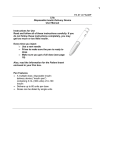
![TEMPLATE No1 [CPMP positive opinion full application]](http://vs1.manualzilla.com/store/data/005681628_1-1a3acb54fcca990dd8c826546eb4788f-150x150.png)
